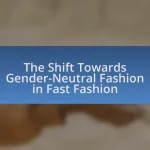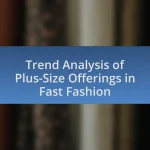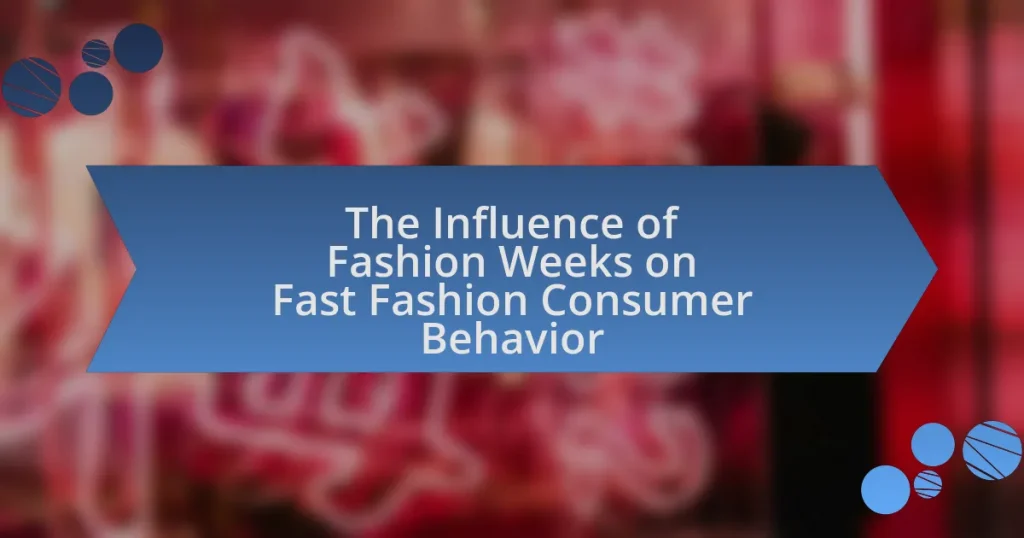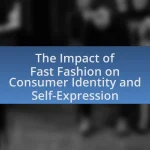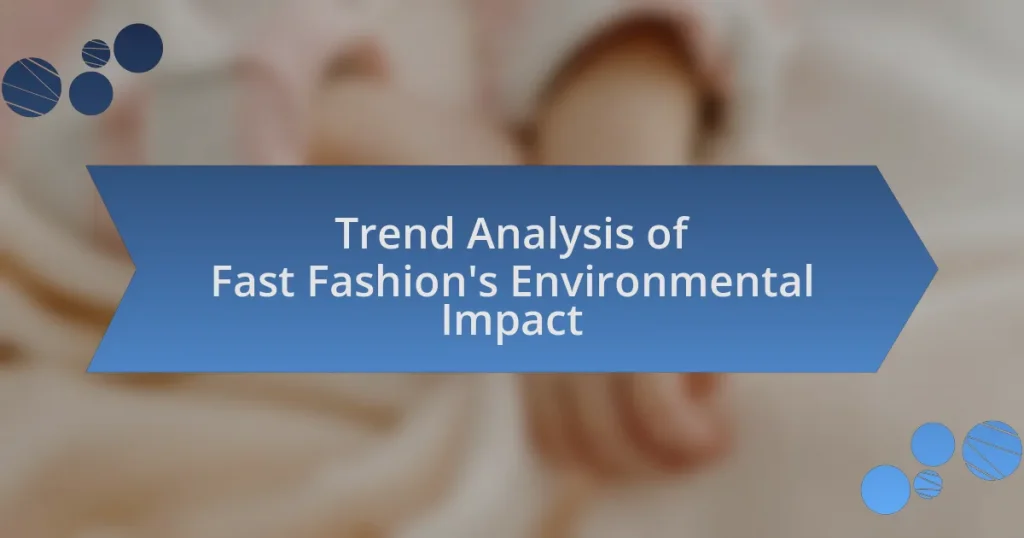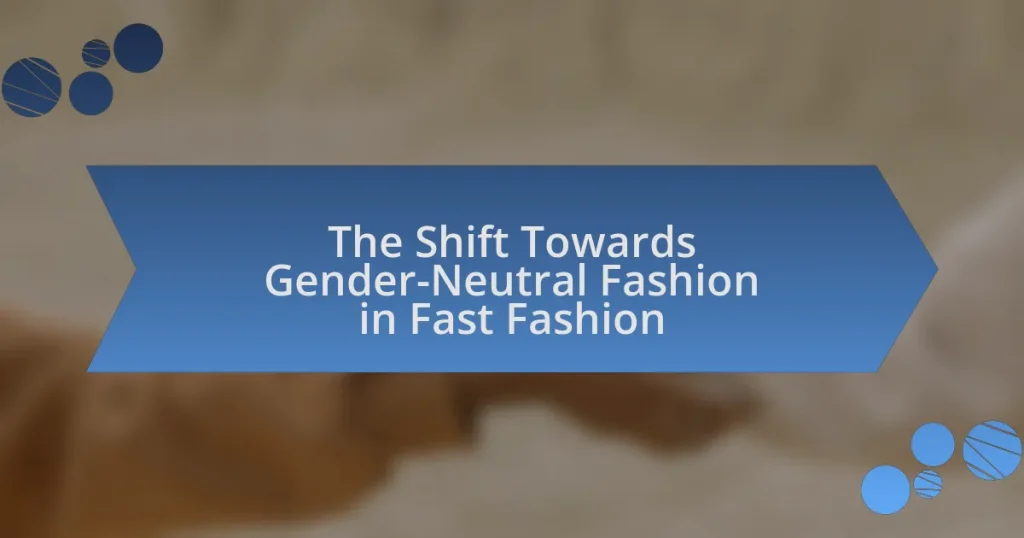The article examines the significant influence of Fashion Weeks on fast fashion consumer behavior, highlighting how these events set trends that drive immediate purchasing decisions. It discusses the psychological effects of runway shows, the role of celebrity endorsements, and the impact of social media coverage on consumer choices. Additionally, the article explores how fast fashion brands capitalize on trends emerging from Fashion Weeks, including pricing strategies and the adoption of sustainable practices. It concludes by addressing future trends in the relationship between Fashion Weeks and consumer behavior, emphasizing the importance of informed purchasing decisions in light of these influences.
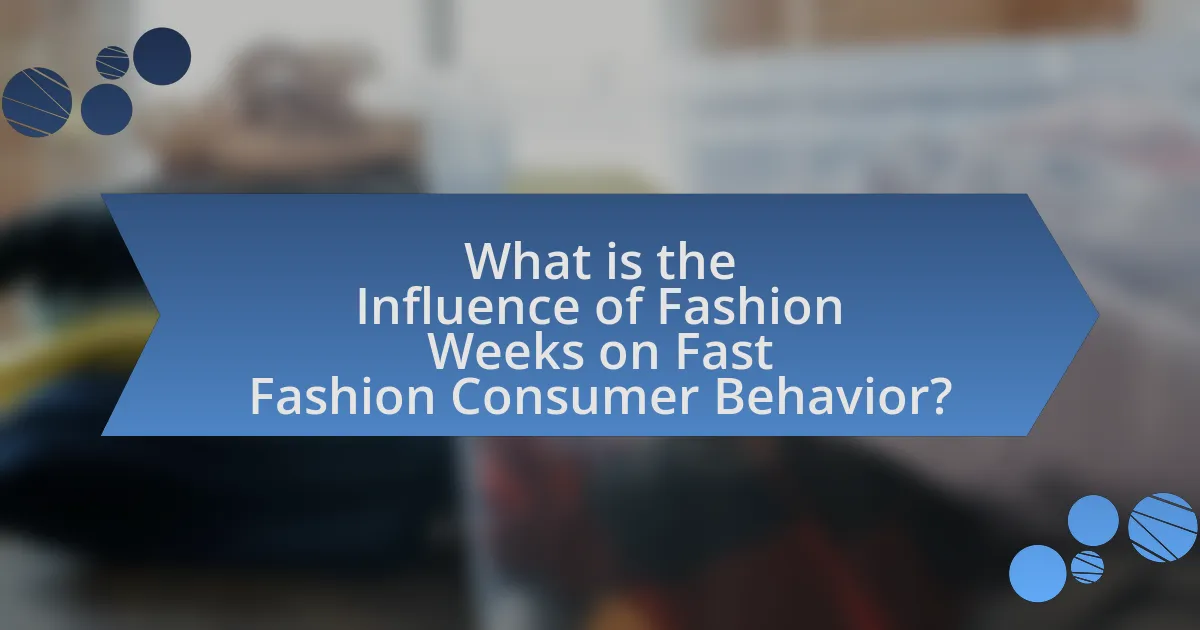
What is the Influence of Fashion Weeks on Fast Fashion Consumer Behavior?
Fashion Weeks significantly influence fast fashion consumer behavior by setting trends that drive immediate purchasing decisions. The exposure to high-fashion designs during these events creates a sense of urgency among consumers, prompting them to seek similar styles at lower prices. Research indicates that 70% of consumers report being inspired to shop for fast fashion after viewing runway shows, highlighting the direct correlation between fashion week presentations and consumer buying patterns. This phenomenon is further supported by the rapid production cycles of fast fashion brands, which capitalize on the latest trends showcased at Fashion Weeks to meet consumer demand quickly.
How do Fashion Weeks shape consumer perceptions of fashion?
Fashion Weeks shape consumer perceptions of fashion by establishing trends and showcasing designer creativity, which influences public taste and purchasing behavior. The high-profile nature of these events garners significant media coverage, amplifying the visibility of new styles and collections. For instance, according to a study published in the Journal of Fashion Marketing and Management, 70% of consumers reported that they follow Fashion Week trends when making purchasing decisions. This indicates that the exposure to runway shows and designer presentations directly impacts consumer attitudes towards fashion, leading to increased demand for similar styles in fast fashion retail.
What role do runway shows play in setting fashion trends?
Runway shows play a crucial role in setting fashion trends by showcasing designers’ latest collections, which influence consumer preferences and retail offerings. These events serve as a platform for designers to present innovative styles, colors, and silhouettes, often dictating the direction of fashion for upcoming seasons. For instance, the Spring/Summer 2023 collections highlighted bold colors and oversized silhouettes, which were subsequently adopted by fast fashion retailers, reflecting the immediate impact of runway trends on consumer behavior. This direct correlation between runway presentations and retail adaptations underscores the significance of runway shows in shaping the fashion landscape.
How do celebrity endorsements during Fashion Weeks impact consumer choices?
Celebrity endorsements during Fashion Weeks significantly influence consumer choices by enhancing brand visibility and desirability. When celebrities showcase specific fashion brands, their large followings often translate into increased consumer interest and purchasing behavior. Research indicates that 70% of consumers are more likely to buy a product endorsed by a celebrity they admire, as seen in a study published in the Journal of Advertising Research. This phenomenon is particularly pronounced during Fashion Weeks, where the convergence of high-profile events and celebrity appearances amplifies the perceived value of the endorsed brands, leading to a spike in sales and brand loyalty among consumers.
Why are Fashion Weeks significant for the fast fashion industry?
Fashion Weeks are significant for the fast fashion industry because they serve as a primary source of inspiration and trend forecasting. These events showcase the latest designs and styles from high-end designers, which fast fashion brands quickly adapt and replicate to meet consumer demand. For instance, the rapid turnaround of collections in fast fashion, often within weeks of Fashion Week, allows brands like Zara and H&M to capitalize on emerging trends, driving sales and consumer engagement. This relationship between Fashion Weeks and fast fashion highlights how the industry relies on these events to stay relevant and competitive in a fast-paced market.
What trends emerge from Fashion Weeks that fast fashion brands capitalize on?
Fast fashion brands capitalize on trends such as bold colors, oversized silhouettes, and sustainable materials that emerge from Fashion Weeks. These trends are often showcased by high-end designers and quickly adopted by fast fashion retailers to meet consumer demand for the latest styles. For instance, the 2023 Spring/Summer Fashion Weeks highlighted vibrant hues and relaxed fits, which were rapidly translated into affordable collections by brands like Zara and H&M. Additionally, the increasing emphasis on sustainability in fashion has led fast fashion companies to incorporate eco-friendly materials and practices, responding to consumer preferences for responsible fashion choices. This alignment with emerging trends allows fast fashion brands to attract a broader audience and maintain relevance in a competitive market.
How do Fashion Weeks influence the pricing strategies of fast fashion retailers?
Fashion Weeks significantly influence the pricing strategies of fast fashion retailers by setting trends that these retailers quickly adopt to remain competitive. Fast fashion brands monitor runway shows to identify emerging styles and then produce similar items at lower prices, capitalizing on the latest trends. For instance, after the Spring/Summer 2020 Fashion Week, brands like Zara and H&M rapidly introduced collections inspired by high-fashion designs, often pricing them 70-80% lower than their luxury counterparts. This strategy not only attracts trend-conscious consumers but also allows fast fashion retailers to maintain a competitive edge in a market driven by rapid trend cycles.
What are the psychological effects of Fashion Weeks on consumers?
Fashion Weeks significantly influence consumers’ psychological states by enhancing their desire for social acceptance and self-expression. The high visibility of trends showcased during these events creates a sense of urgency and aspiration among consumers, often leading to increased purchasing behavior. Research indicates that exposure to fashion shows can elevate consumers’ self-esteem and body image, as they associate the latest styles with status and desirability. Additionally, the phenomenon of “FOMO” (fear of missing out) is prevalent, as consumers feel pressured to keep up with rapidly changing trends, which can lead to impulsive buying decisions. Studies have shown that 60% of consumers report feeling more inclined to shop after viewing Fashion Week content, highlighting the direct psychological impact these events have on consumer behavior.
How does the exclusivity of Fashion Weeks affect consumer desire for fast fashion?
The exclusivity of Fashion Weeks significantly increases consumer desire for fast fashion. This phenomenon occurs because Fashion Weeks create a sense of urgency and aspiration, showcasing limited collections that are often unattainable for the average consumer. As a result, consumers are motivated to seek out fast fashion alternatives that replicate high-fashion trends at accessible prices. Research indicates that the rapid turnover of styles in fast fashion aligns with the fleeting nature of trends presented during Fashion Weeks, further driving consumer demand. For instance, a study by the Fashion Institute of Technology found that 70% of consumers reported feeling compelled to purchase fast fashion items after viewing runway shows, highlighting the direct correlation between exclusivity and consumer behavior in the fast fashion market.
What impact does social media coverage of Fashion Weeks have on consumer behavior?
Social media coverage of Fashion Weeks significantly influences consumer behavior by increasing brand awareness and driving purchasing decisions. Research indicates that platforms like Instagram and Twitter amplify the visibility of fashion trends showcased during these events, leading to a surge in consumer interest and engagement. For instance, a study published in the Journal of Fashion Marketing and Management found that 70% of consumers reported being influenced by social media posts related to Fashion Week, prompting them to seek out similar styles in fast fashion retailers. This direct correlation between social media exposure and consumer purchasing behavior underscores the critical role that digital platforms play in shaping fashion trends and consumer preferences.
How do Fashion Weeks and fast fashion interact in the marketplace?
Fashion Weeks and fast fashion interact in the marketplace by setting trends that fast fashion brands quickly replicate. Fashion Weeks showcase high-end designers’ collections, which often influence consumer preferences and create demand for similar styles. Fast fashion retailers, such as Zara and H&M, monitor these events closely and can produce similar garments within weeks, capitalizing on the latest trends. This rapid production cycle allows fast fashion to respond to the trends established at Fashion Weeks, making high-fashion looks accessible to a broader audience. The interaction is evident in the way fast fashion brands often release collections that mirror runway styles shortly after Fashion Weeks, demonstrating their reliance on the trends set by these prestigious events.
What are the implications of Fashion Weeks for sustainable fashion practices?
Fashion Weeks significantly influence sustainable fashion practices by showcasing eco-friendly designs and raising awareness about sustainability in the industry. These events provide a platform for designers committed to sustainable practices, encouraging the adoption of environmentally friendly materials and production methods. For instance, the 2021 Copenhagen Fashion Week implemented a sustainability action plan that required participating brands to meet specific environmental criteria, demonstrating a shift towards accountability in fashion. This visibility can lead to increased consumer demand for sustainable options, as seen in a 2020 McKinsey report indicating that 67% of consumers consider sustainability when making a purchase. Thus, Fashion Weeks play a crucial role in promoting sustainable practices by influencing both industry standards and consumer behavior.
What specific strategies do fast fashion brands use to leverage Fashion Weeks?
Fast fashion brands leverage Fashion Weeks by utilizing strategies such as rapid trend adoption, influencer partnerships, and extensive social media marketing. These brands closely monitor runway shows to identify emerging trends, allowing them to quickly produce similar styles at lower prices. For instance, Zara and H&M often release collections that reflect the latest designs seen on the catwalk within weeks, capitalizing on consumer demand for trendy apparel. Additionally, fast fashion companies collaborate with influencers and celebrities to amplify their visibility during Fashion Weeks, creating buzz and driving traffic to their stores. This approach is supported by data showing that influencer marketing can yield a return on investment of up to $6.50 for every dollar spent. Furthermore, fast fashion brands employ social media campaigns to engage consumers in real-time, showcasing their new collections and encouraging immediate purchases, which aligns with the fast-paced nature of fashion consumption today.
How do fast fashion brands utilize influencer marketing during Fashion Weeks?
Fast fashion brands utilize influencer marketing during Fashion Weeks by partnering with social media influencers to showcase their collections in real-time, thereby increasing brand visibility and consumer engagement. These brands often invite influencers to exclusive events, ensuring that they share live updates, outfit posts, and behind-the-scenes content with their followers, which can lead to heightened interest and immediate sales. For instance, a study by the Fashion Retail Academy found that 70% of consumers are influenced by social media posts when making fashion purchases, highlighting the effectiveness of this strategy.
What role does limited edition merchandise play in fast fashion’s response to Fashion Weeks?
Limited edition merchandise serves as a strategic tool for fast fashion brands to capitalize on the trends showcased during Fashion Weeks. By releasing exclusive items that reflect the latest runway styles, fast fashion retailers create a sense of urgency and desirability among consumers, driving immediate sales. For instance, brands like Zara and H&M often launch limited collections shortly after major Fashion Weeks, aligning their offerings with high-fashion trends to attract trend-conscious shoppers. This approach not only enhances brand visibility but also fosters a perception of exclusivity, encouraging consumers to purchase quickly before items sell out.
What are the future trends in the relationship between Fashion Weeks and fast fashion consumer behavior?
Future trends indicate that Fashion Weeks will increasingly influence fast fashion consumer behavior by accelerating the speed of trend adoption and promoting sustainability. As Fashion Weeks showcase collections that are rapidly disseminated through social media, consumers are becoming more accustomed to quick turnarounds in style, leading fast fashion brands to adapt by shortening production cycles. Additionally, there is a growing consumer demand for sustainable practices, prompting fast fashion retailers to incorporate eco-friendly materials and ethical production methods in response to the trends highlighted during Fashion Weeks. This shift is supported by research from McKinsey & Company, which notes that 67% of consumers consider sustainability when making fashion purchases, indicating a significant change in consumer priorities that fast fashion brands must address.
How can consumers make informed choices in light of Fashion Weeks’ influence?
Consumers can make informed choices in light of Fashion Weeks’ influence by critically evaluating trends and prioritizing sustainable brands. Fashion Weeks often set the tone for upcoming styles, but consumers should research the environmental and ethical practices of brands before purchasing. For instance, a 2021 report by the Global Fashion Agenda highlighted that the fashion industry is responsible for 10% of global carbon emissions, emphasizing the importance of choosing brands that prioritize sustainability. By seeking transparency in supply chains and opting for eco-friendly materials, consumers can align their purchases with their values while mitigating the negative impacts of fast fashion.


